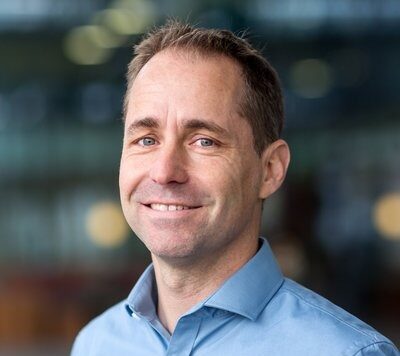

Prof. Maarten Merkx
Full professor and Dean at the Department of Biomedical Engineering, Head of the Protein Engineering group.
Coordinator; supervisor of ESR3, co-supervisor of ESRs 8, 9 and 13 and external co-supervisor of ESRs 6, 10, 11 and 12; lead of WP7 and deputy lead of WP2.
“Hybrid protein-DNA nanoswitches combine the excellent molecular recognition properties of proteins with the tunability and designability of DNA nanostructures, which renders them ideally suited for continuous monitoring via single-molecule optical detection.”
Maarten Merkx is full professor at the department of Biomedical Engineering of Eindhoven University of Technology (TU/e), where he leads the research group Protein Engineering operating at the interface of chemical biology and synthetic biology. His research group combines approaches from protein engineering, chemical biology, and synthetic biology to develop biomolecular sensors and actuators for applications in intracellular imaging, point-of-care diagnostics, optogenetics, and antibody-based therapies.
Maarten Merkx studied physical organic chemistry and biochemistry at Radboud University Nijmegen. In 1999, he received his PhD from the University of Amsterdam under Prof. Averill. He is currently Professor of Protein Engineering at Eindhoven University of Technology, core member of the Institute for Complex Molecular Systems (ICMS) and Dean of the Department of Biomedical Engineering. Merkx received a Young Investigator Grant (VIDI 2006), as well as an ERC Consolidator Grant in 2011 and an ERC Proof of Concept Grant in 2015 and 2017. As the only Dutch scientist he was invited in 2015 to speak at the World Economic forum in a session on the future of synthetic biology. In 2017 he reached the media with his expertise on DNA computing, amongst others an article on wired.com. In 2019 he received an NWO Take Off grant to map the commercial possibilities of his glow-in-the-dark paper-based assays for point-of-care diagnostics. Furthermore, he was awarded multiple times as best teacher in the master’s program and received the award for the best TU/e teacher at the master level in 2012. In November 2019, he became the dean of the TU/e department of Biomedical Engineering.
– C. Yang, F. Sesterhenn, J. Bonet, E. van Aalen, L. Scheller, L. A .Abriata, J. T. Cramer, X. Wen, S. Rosset, S. Georgeon, T. Jardetzky, T. Krey, M. Fussenegger, M. Merkx, B. E. Correia A bottom-up approach for the de novo design of functional proteins
Nature Chem. Biol. (2021) https://doi.org/10.1038/s41589-020-00699-x
– S.F.A. Wouters, W.J.P. Vugs, R. Arts, N.M. de Leeuw, R.W.H. Teeuwen, M. Merkx
Bioluminescent antibodies through photoconjugation of protein-G-luciferase fusion proteins Bioconj. Chem. (2020) 31, 3, 656–662
– W. Engelen, K. Zhu, N. Subedi, A. Idili, F. Ricci, J. Tel, M. Merkx
Programmable bivalent peptide–DNA locks for pH-based control of antibody activity
ACS Central Science 2020, 6, 22–31
– Y. Ni, R. Arts, M. Merkx
Ratiometric bioluminescent sensor proteins based on intramolecular split luciferase complementation
ACS Sensors (2019) 4, 20-25
– K. Tenda, B. van Gerven, R. Arts, Y. Hiruta, M. Merkx, D. Citterio
Paper-based antibody detection devices using bioluminescent BRET-switching sensor proteins Angew. Chem. Int. Ed. (2018) 57, 15369-15373
– W. Engelen, S.P.W. Wijnands, M. Merkx
Accelerating DNA-based computing on a supramolecular polymer
- Am. Chem. Soc. (2018), 140, 9758-9767
– M. van Rosmalen, M. Krom, M. Merkx
Tuning the flexibility of glycine-serine linkers to allow rational design of multidomain proteins Biochemistry (2017), 56, 6565-6574
